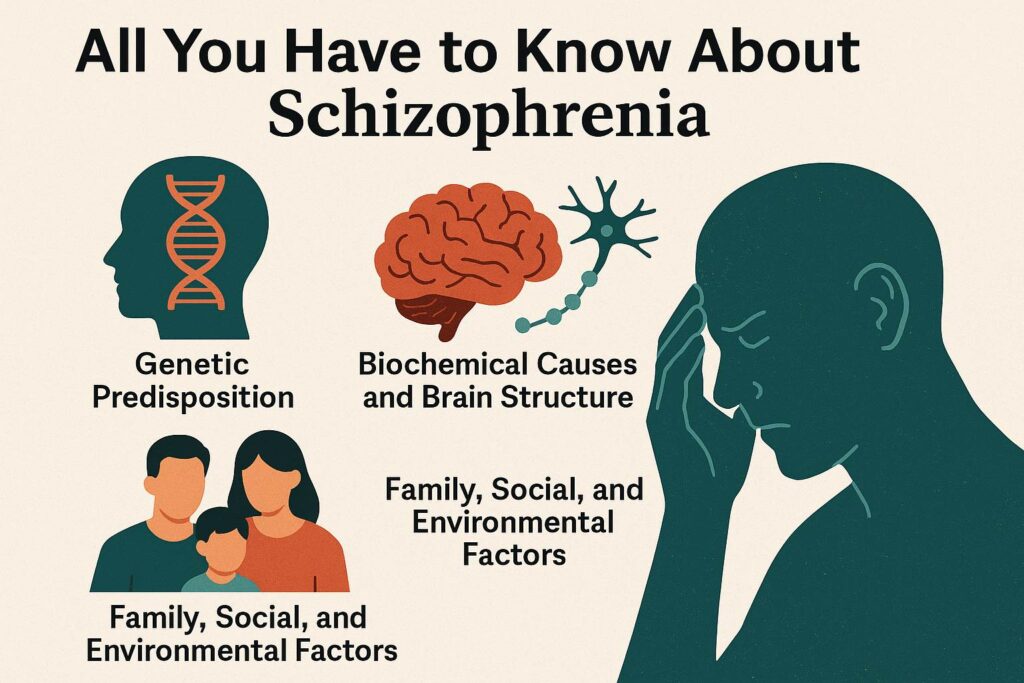
Schizophrenia is a complex mental disorder whose origins are still not fully understood. Experts believe it results from an interaction of various factors such as genetics, environmental influences, and individual life experiences.
People affected by schizophrenia seem to be more sensitive to internal and external stimuli. Even before the onset of the illness, they often have a lower tolerance for psychological, physical, and emotional stress. This particular sensitivity, known as vulnerability, plays a major role in triggering and maintaining the disorder.
For Treatment of Schizophrenia Contact Dr. Kowal
Call CHMCGenetic Predisposition
A family history of schizophrenia increases the likelihood of developing the condition. Studies have shown that around half of the children whose parents suffer from schizophrenia display some psychological abnormalities, and about 12% eventually develop the illness themselves.
In comparison, the lifetime risk in the general population is only about 0.5 to 1%. However, heredity alone does not determine the development of schizophrenia. In fact, about 80% of cases occur in individuals with no prior family history of the disorder, which means that genetics are only part of a larger picture.
Biochemical Causes and Brain Structure
The human brain is a highly intricate network of billions of nerve cells communicating through chemical messengers called neurotransmitters. Schizophrenia is thought to result, at least in part, from an imbalance of these neurotransmitters, which disrupts how information is processed in the brain.
One of the most studied chemicals in this context is dopamine. Elevated dopamine activity has long been linked to psychotic symptoms such as hallucinations and delusions. More recent studies also point to the involvement of other neurotransmitters, especially glutamate. This biochemical imbalance forms the foundation for modern medication-based treatments aimed at restoring balance in brain chemistry.
Furthermore, neuroimaging studies have revealed structural differences in the brains of people with schizophrenia compared to those without the disorder. These include irregularities in the limbic system—responsible for emotional regulation—and a reduced number of neurons involved in transmitting signals. Advanced imaging techniques such as CT scans, MRI, PET, and SPECT have consistently shown these patterns, supporting the biological basis of schizophrenia.
Family, Social, and Environmental Factors

In the past, scientists suspected that family dynamics, parenting styles, and certain communication patterns might cause schizophrenia. However, scientific evidence has not confirmed this theory.
There is no indication that poor parenting or a dysfunctional family environment directly leads to schizophrenia. What has been proven, however, is that family communication and emotional climate can influence how schizophrenia progresses. For example, overly protective or critical attitudes within a family can impact the patient’s recovery and risk of relapse.
It’s also important to recognize that these behavioral patterns often develop as a reaction to the illness rather than its cause. Parents who sense their child’s psychological vulnerability might become more protective out of concern. Stressful life events such as moving to a new place, a breakup, or job loss do not cause schizophrenia, but they can exacerbate symptoms or trigger a relapse in someone who is already vulnerable.
Causes of Schizophrenia. Summary
Schizophrenia is a multifaceted disorder influenced by biological, genetic, and environmental components. No single factor can explain its development. Instead, it emerges when biological predispositions interact with environmental stressors and individual life experiences.
Understanding these connections allows for better treatment and support for those affected. Modern psychiatry now focuses not only on medication but also on psychotherapy and family involvement to help patients lead stable and fulfilling lives.


